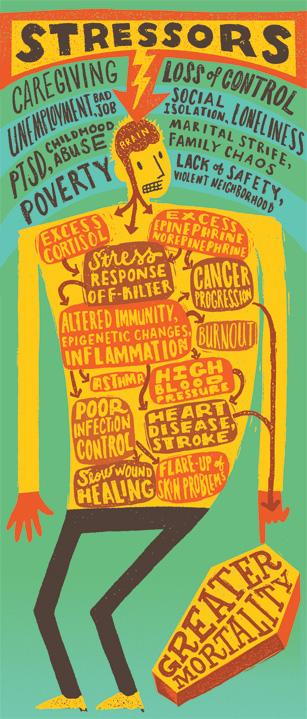- posted: Feb. 11, 2016
This week we wanted to discuss chronic stress, and the effect it can have on our bodies. We live in a fast-paced society and our bodies are constantly exposed to outside stressors. How do we learn to control how we process those stressors and reduce the health effects that long-term stress can cause.
First, what happens on a physiological level when we are in a state of chronic stress?
Humans are meant to be great at handling short-term stress, but our systems are not built to handle the chronic stress that we have grown accustomed to in our society. When we are in a state of long-term stress, our autonomic nervous system will go into overdrive. We are meant to use our "fight or flight" response when dealing with an immediate danger that we need to get away from. Constantly living in that "amped" state, as though there is an ever-present danger, can wreak havoc on the body.
The first physiological response is received through our senses and processed in the amygdala. If the amygdala determines a threat, a distress signal is sent to the hypothalamus. The hypothalamus signals the adrenal glands to pump out epinephrine. This release of epinephrine causes blood pressure and pulse rate to increase. Epinephrine also triggers the release of glucose and fats that are stored in temporary sites in the body. In an acute stress situation, the parasympathetic nervous system would then kick in, taking the body into rest and digest mode. During chronic stress, the HPA Axis (Hypothalamus Pituitary Adrenal Axis) takes over, allowing the sympathetic nervous system to continue firing. When the brain continues to perceive danger, the hypothalamus will then release Corticotropin Releasing Hormone (CRH) to communicate with the pituitary gland, which releases Adrenocorticotropic Hormone (ACTH). ACTH then travels to the adrenal glands and stimulates the release of cortisol. We stay in this pattern until we can relax and allow the parasympathetic nervous system to take over and calm us down.
I'm always hearing about the dangers of elevated cortisol levels. Why is this so dangerous?
When released properly in response to acute stress, cortisol is responsible for increasing glucose levels in the blood with the purpose of having energy readily available to fight or flee. This is a healthy physiological response. Problems start to arise however, when we have elevated cortisol levels for too long. A few examples of this are:
- Impaired cognitive performance
- Decreased bone density
- Lowered immunity levels
- Suppressed thyroid function
- Blood sugar imbalances

So, how do I know if I am living in a state of chronic stress?
Here are just a few symptoms that you may have experienced:
- Chronic allergies
- Difficulty fighting off infection
- Trouble waking up in the morning, even after a full night's sleep
- Anxiety
- Craving sugar and salty foods
- Depression
- Low sex drive
- Social isolation
- Difficulty concentrating
- Panic Attacks
How can I reverse chronic stress and reduce cortisol levels?
- Exercise! When cortisol levels are consistently elevated due to chronic stress, providing an outlet for our "fight or flight" response can be very helpful in reducing the circulating cortisol levels in the bloodstream. Moving for 20-30 minutes each day has been shown to significantly reduce excess cortisol and other stress responses.
- Eating a diet that doesn't spike your blood sugar can be very helpful in controlling the release of cortisol. Eat lots of veggies and meats, and skip the caffeine and alcohol--ie The Dr. P diet. :)
- Be social! Spending time with good friends and family that make you feel safe and understood can be calming to the nervous system.
- Adapt to the stressors that are affecting you. This one is a little tough, but thinking of a bigger picture and realizing the things that you are fortunate for in your own life can be very helpful in finding perspective, and therefore helpful in handling stress more effectively.
- Meditation. This may seem intimidating, but it doesn't have to be. Start with sitting quietly and thinking about your breath. When in doubt, say to yourself "this breath in" with each inhalation, and "this breath out" for each exhale. Set a timer on your phone for 5 minutes. When the alarm goes off, you're done! Of course you can practice for longer periods of time, and add mantras when you are comfortable, but the last thing that you want to do is create stressful thoughts around your de-stressing exercise. :)
- Laugh! A sense of levity in each day has also been proven to significantly reduce chronic stress.
Ultimately, we can't eliminate stress from our lives, but we can make conscious efforts to handle the inevitable stress with grace and ease. We wish you and yours a light, and happy week!
Locations
6940 South Holly Circle Suite 201
Centennial, CO 80112, US
Office Hours
Our Regular Schedule
8am - 1pm
3pm - 5pm
8am – 1pm
3pm – 7pm
Closed
Closed
8am – 1pm
3pm – 7pm
8am – 2pm
Closed
Closed
Closed
Closed
Closed

